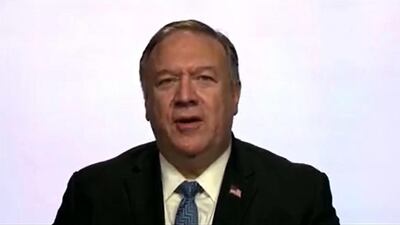The US State Department has ended five cultural exchange programmes with China, calling them "soft power propaganda tools".
The department "terminated" the Policymakers Educational China Trip Programme, the US-China Friendship Programme, the US-China Leadership Exchange Programme, the US-China Transpacific Exchange Programme and the Hong Kong Educational and Cultural Programme, Secretary of State Mike Pompeo said in a statement on Friday.
The programmes were set up under the Mutual Educational and Cultural Exchange Act – a 1961 law signed by President John F Kennedy and aimed at boosting academic and cultural exchanges with foreign countries.
"While other programmes funded under the auspices of the MECEA are mutually beneficial, the five programmes in question are fully funded and operated by the [Chinese] government as soft power propaganda tools," Mr Pompeo said.
"They provide carefully curated access to Chinese Communist Party officials, not to the Chinese people, who do not enjoy freedoms of speech and assembly."
He said the US welcomed reciprocal and fair exchange of cultural programmes with Chinese officials and people but said that one-way programmes such as these were not mutually beneficial.
The State Department also announced on Friday that it would deny visas to Chinese citizens linked to overseas influence operations involving violence and other means of intimidation.
Mr Pompeo said the restrictions would apply to Chinese Communist Party officials or anyone else taking part in such propaganda or influence campaigns affiliated with the United Front Work Department.
The United Front has been involved in efforts to put pressure on people outside China's borders who raise concerns about human rights abuses in the Uighur region, Tibet and elsewhere. Its “coercive tactics” have included publicly releasing personal details about critics and their family members online as a means of intimidation, Mr Pompeo said.
The measure is intended to show that “those responsible for actions that contravene the rules-based international order are not welcome in the United States,” he said.
The restrictions are the latest punitive measure taken by the US against China’s leadership and economy in response to sharpening disputes over human rights, the coronavirus pandemic, trade, technology, Taiwan and a host of other issues.
Earlier this week, the US also moved to tighten visa rules on members of the Chinese Communist Party. The State Department said the action was part of ongoing efforts to protect the country from the party’s “malign influence”.

